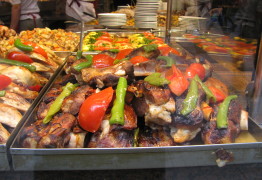My day starts with Nestlé, the Swiss company that in the 1970s promoted infant formula in developing countries in which clean drinking water was unavailable. That company somehow has its name on a majority of the breakfast cereals here, including those that carry the Quaker brand in the U.S. At first I vowed to continue my lifetime boycott of the company, but few other cereals were available and I am a conservative when it comes to breakfast, and I soon caved. I suppose I could have switched to a Turkish breakfast: tomatoes, cucumbers, olives and white cheese. Interesting, isn’t it, that Turks take in their breakfast nutrients in natural form whereas we Americans consume them as additives?
On my morning “Nesfit” flakes goes long-life milk, which tastes the same as pasteurized milk at home, yet consists of a mere one tenth percent fat. Coffee is from Costa Rican beans brought from home; despite the famed Turkish coffee, this is a country of tea drinkers, and when you order a regular cup of coffee at a restaurant, you are inevitably brought (grrr) Nescafe. Sometimes we toast bread. I have a jar of luscious raspberry jam that has Turkish, Cyrillic and English characters it, the Cyrillic making it marketable in Bulgaria, Russia, Azerbaijan and some of the “stan” countries. As I spread it on my toast, I picture a misty, densely wooded area near the Black Sea, and women in long scarves picking fruit.
Before lunch I often walk down the hill to a little bakkal where I find unwrapped loaves of fresh bread stashed in a wooden bin, for only one Turkish lira, about 60 cents. A lunch favorite is tuna salad from a recipe my Libyan friend, Zack, gave me. I call it “knock your socks off tuna salad.” It contains tuna (Dardanelle brand, another geography lesson), cilantro, tomatoes, cucumber and hot sauce, and I will send you the recipe on request. Peach season seems to be ending here, and we’re getting varieties of grapes, including some small green ones that are surprisingly sweet.
The other day I saw large black raisins packaged on Styrofoam trays covered with plastic. I bought a pack, but then, driving home, realized they might have seeds. Most of the grapes here have seeds. “Yes, they do,” Umit replied. “But they are so good for your bones—and for your blood.” Umit is my unofficial nutritionist. I looked it up and indeed grape seeds are high in antioxidants. So our raisins go crunch, but it’s all texture; the seeds don’t have any flavor.
That day I also bought some poppy seeds. I had thought they were unavailable in Turkey. “Mavi” means blue, and the label, kind of alarmingly, reads “hashhash mavi.”
We haven’t been very adventurous about supper yet; perhaps that is part of our adjustment: we are tentative even about what we eat. Lots of rice; chicken or beef or sometimes fish (levret, fresh sea bass is a treat). My convection oven does an incredible job of roasting cut-up potatoes (coated with olive oil and garam masala), something I would cook on the grill at home. Can you believe my nine-year-old oven back home has the convection feature, but I have never tried it?
We were about to buy a little gas grill and figured we’d put it on our apartment’s small back balcony, but then wondered if that kind of thing might be considered a fire hazard. We didn’t think we could really grill meat in secret. We asked our uber neighbor, the one that kind of runs things in our building, and he suggested placing it down in the apartment garden. The idea of running up and down from the third floor, plates of food and utensils in hand, kind of killed the fun, and I think we will do without.
Ramazan (the Turks use a z) ended a couple weeks ago. It was an interesting month. Back in Yemen thirty years ago, I felt sorry for the women, who fasted but also had to cook the big iftar meal at the end of every day as well as the meal eaten just before sunrise. That while also feeding and caring for young children, who don’t fast until adolescence. Well, in Turkey, women are working outside the home and are quite assertive. Ramazan is the month of fasting, but, you heard it here first, it is also the month of takeout. We discovered this when the kids arrived and we went to get some wonderful, grilled chicken from a nearby specialty market. Nothing doing: the fasting Turks had beaten us to it.
It was funny to see commercial establishments hopping on the Ramazan bandwagon. Down by The Boss I came across a big, lighted sign urging Turks to come to Pizza Hut for iftar and listing all the great “value items” on its “special menu.” But I can’t really blame them: what restaurant wouldn’t want to attract customers who haven’t eaten for fourteen hours? And 3M gave each of its employees a cheesy, corporate-looking box of candy for the holiday that follows Ramazan, so much like company Christmas gifts in the States.
It was also nice to see nuance, which is the great benefit of being on the ground in a Muslim country. The man who, to the dismay of his parents, refused for years to fast, but now in his mid-thirties makes it his only religious observance of the year. The couple we know that disdains anything religious in public life and does not favor extending full rights to women who wear the headscarf. . . yet the husband was the one of only a few at his company that did the fast. Just like us, people here are inconsistent and unpredictable in how they let religion into their lives.
A few weeks ago we took a vapor (ferry) over to the Asia side and went with some Turkish friends to a restaurant called Ciya that was written up in The New Yorker this past April. The restaurant is reviving Turkish food from several generations ago, and it is said that Turks sometimes burst into tears of sentimentality as they eat food they recall from their grandmothers’ or great-grandmothers’ kitchens. We drank the thyme tea that was mentioned in the article, but our conversation prevented me from noting down the various dishes we were eating. We will go back.
Here in Turkey, I often feel like I come from a country with no history, that the past somehow broke off for all of those who made the move across the ocean. I yearn in vain to be part of some continuous, ancient lineage, heir to some traditional wisdom. But a rare good deed I did during these months of self-absorption helped me think differently. When Umit’s birthday came around in mid-August, I assembled the ingredients and baked him and his parents a carrot cake. Baking is not a tradition here; homes have up until recently not been equipped with ovens. Commercial bread bakeries exist, but for desserts, Turks traditionally eat baklava-type sweets that don’t require baking.
I wanted to produce something from my own country—and also use those hard-won measuring spoons. The cake turned out well, and Umit and his family raved about it. Hearing their compliments, I realized I did indeed have something to be proud of, and I was pleased to inform him, “My family has been baking for at least a hundred and fifty years.”




Sweet! I love how food spans oceans, generations, and misunderstandings.
I remember you writing about Sankar’s reaction to American desserts when he was first at Cornell. At their best, American desserts are really fabulous–and I don’t think it’s just when compared with other American dishes.
By the way, we went to Dosa King this afternoon with Luca and Toni, and while we were eating, I remarked that we would have to come here with you and Sandy when you are back for a visit.
Hi Sue, I was busily ‘devouring’ this entry (lots of good food talk)when I came to the part about Umit’s birthday cake. I had to laugh and reread the segment: I was wondering how Umit’s parrot became involved in the story. I don’t know if you recall that I have glaucoma and sometimes (often) miss things. They disappear in my blind spots and what’s left of my brain fills in the blanks, sometimes with humorous results.